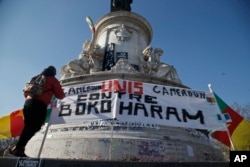Nigeria announced Saturday that it was postponing the February 14 presidential election for six weeks because of security concerns and the Boko Haram insurgency.
The head of the country's Independent National Electoral Commission, Attahiru Jega, said at a news conference, "If the security of personnel, voters, election observers and election materials cannot be guaranteed, the lives of innocent young men and women and the prospect of free, fair and credible elections will be greatly jeopardized."
Islamic Boko Haram militants control large parts of northeastern Nigeria. Experts have said conducting a peaceful vote in those areas would most likely be impossible.
However, U.S. Secretary of State John Kerry said in a statement Washington is "deeply disappointed" by Nigeria's decision to postpone the election.
"Political interference with the Independent National Electoral Commission is unacceptable," Kerry said. "It is critical that the government not use security concerns as a pretext for impeding the democratic process."
President Goodluck Jonathan is seeking another term. But many Nigerians have criticized him and his government for what they say is its failure to defeat the extremists.
Earlier Saturday, four West African countries announced plans to join forces to help their neighbor Nigeria fight the Boko Haram militants.
Delegates from Benin, Cameroon, Chad, Niger and Nigeria revealed their plan at the end of three days of talks in Cameroon. Experts from the African Union and United Nations also participated.
The plan calls for deploying 8,750 soldiers in the area next month, where Boko Haram is fast becoming a regional threat.
Details on how the force will operate were not disclosed. Cameroon's defense minister, Edgard Alain Mebe Ngo'o, said that would be like revealing military secrets.
Representatives from the five African countries said they urgently needed $4 million to deploy the force. A U.N. representative said she would submit the request to the secretary-general and Security Council, but for now, the U.N. could provide only logistical support.
Boko Haram has carried out a bloody campaign of terrorism since 2009 to turn Nigeria into an Islamic state, but recently it has also attacked towns in Cameroon, Chad and Niger. Civilians, including children, are frequent victims of Boko Haram violence.
U.S. intelligence officials said the group has 4,000 to 6,000 hard-core fighters. A U.S. State Department spokeswoman said Boko Haram's "brutality and barbarism know no bounds."













